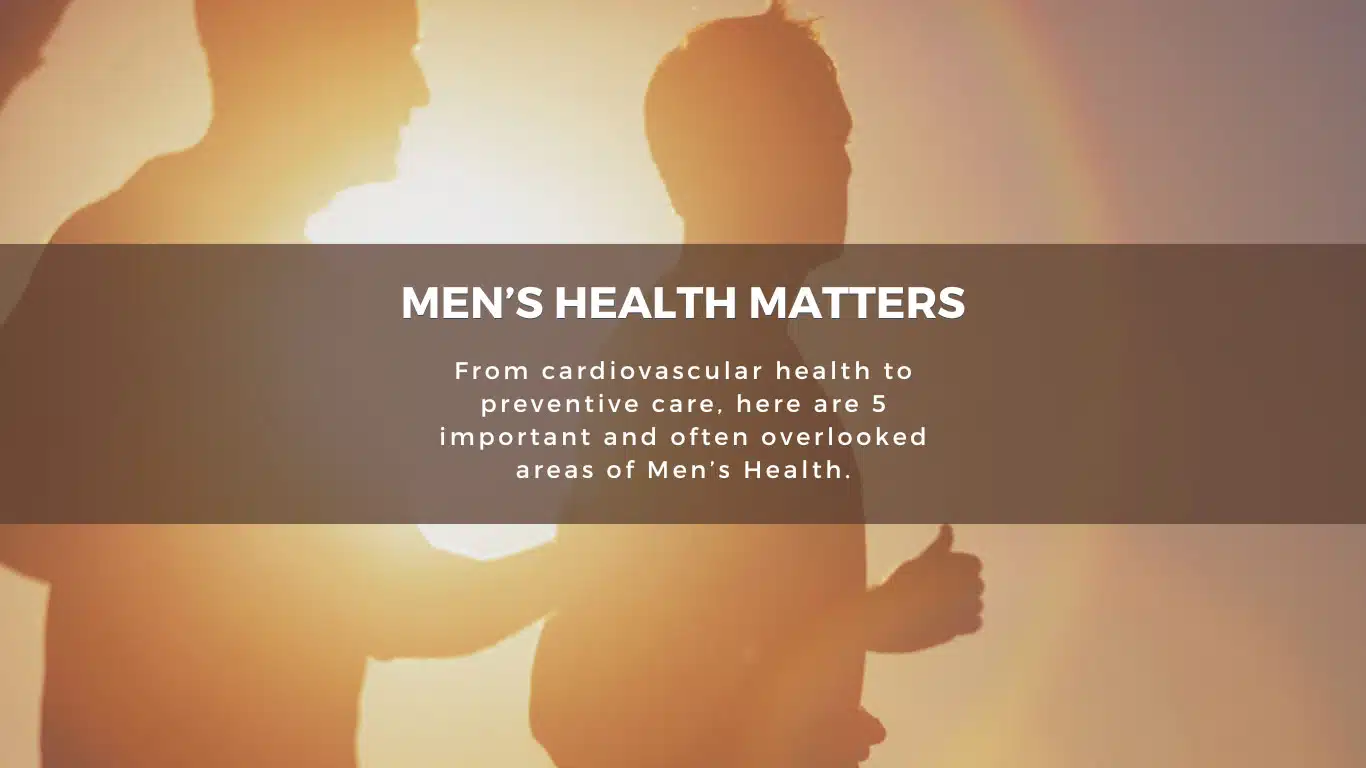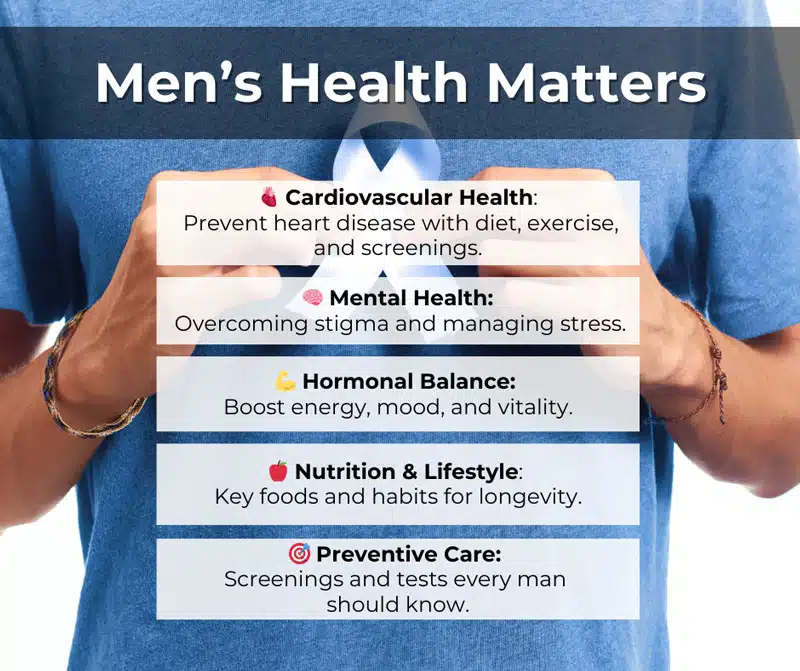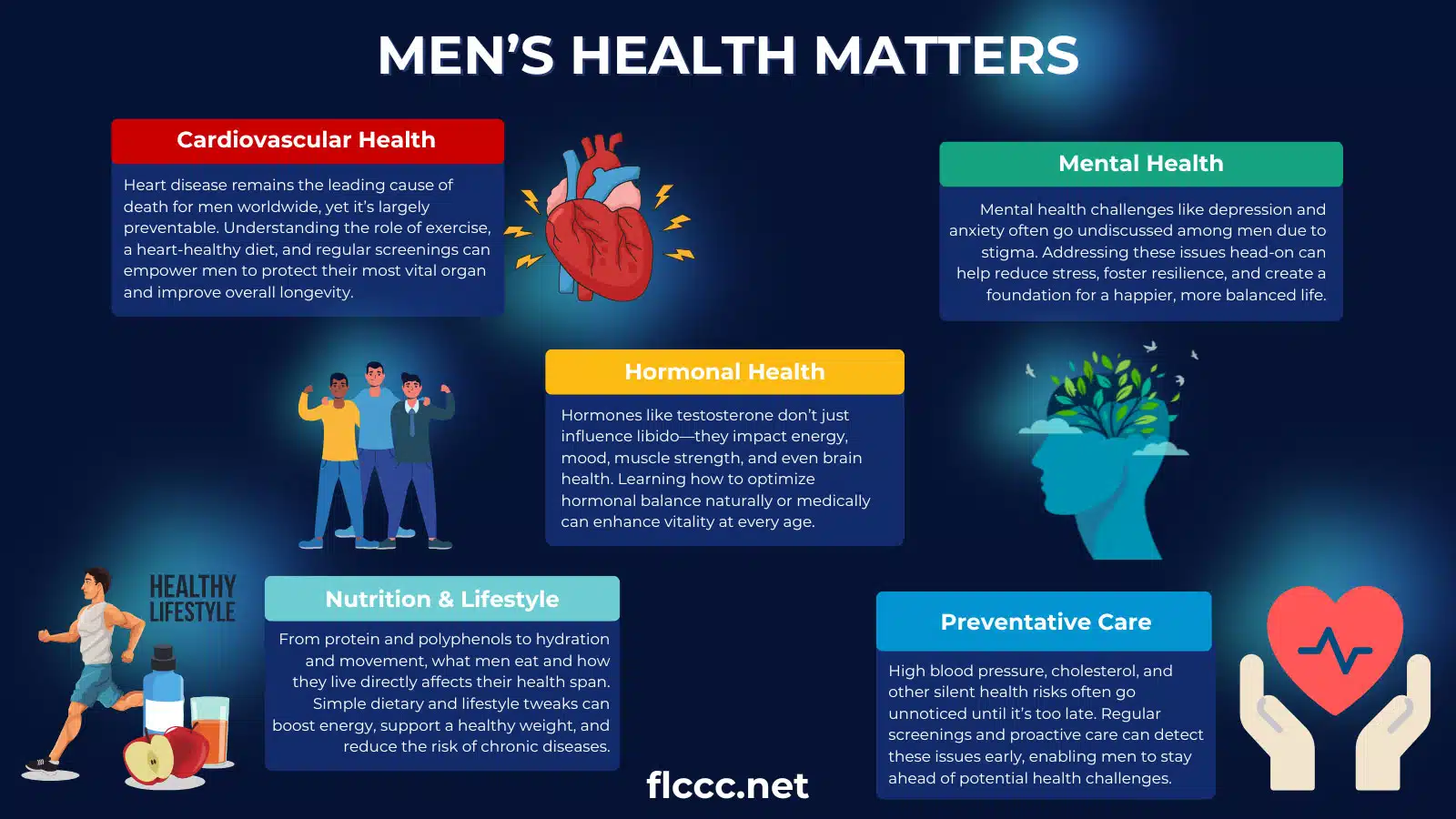Uncover the 5 biggest health challenges men face, from cancer risks to overlooked issues, and explore expert tips to take charge of your well-being through prevention and proactive care.

Men aren’t exactly famous for staying on top of their health. Whether it’s skipping routine checkups, ignoring unusual symptoms, or assuming “it’ll sort itself out,” many men tend to put their health on the back burner. Research consistently shows that men are less likely than women to visit their primary care provider or seek preventive care, even when dealing with serious health risks.
But here’s the kicker—many of the major health risks that men face, like heart disease, cancer, and mental health struggles, are preventable or manageable with early detection. By addressing key health threats proactively, you can improve your own quality of life and avoid crises that could’ve been prevented.
This article breaks down the five top men’s health issues, from heart disease to prostate cancer, and offers actionable steps to help you protect your body and mind. It’s part of our growing series of men’s health guides designed to empower you with the knowledge to take control of your well-being. Let’s jump in!
🔍 Click to Enlarge
1. Heart Disease: The Leading Cause of Death Among Men
Heart disease remains the leading cause of death among men in the United States. Risk factors include high blood pressure, high cholesterol, smoking, alcohol use, diabetes, obesity, and lack of physical activity. Men are more likely than women to develop cardiovascular problems earlier in life, making regular screenings a must.
Smoking is the leading cause of heart disease and lung cancer, contributing to chronic obstructive pulmonary disease (COPD), emphysema, and chronic bronchitis. Combine that with other factors like stress and poor diet, and it’s clear why heart disease is such a prevalent health threat among men.
Prevention Through Lifestyle Changes
Adopting a healthy lifestyle is your best defense. Start with simple changes: eat a diet rich in whole grains, lean proteins, and vegetables. Many physical activity guidelines recommend at least 150 minutes of moderate-intensity exercise per week. Always work with your doctor before starting any new exercise routines. And don’t forget to schedule regular checkups with your primary care provider to monitor your cholesterol and blood pressure levels.
⚕️ Takeaway: Your heart is your engine—keep it running strong with regular care and smart habits.
2. Cancer in Men: Prostate, Lung, and Colon Cancer
Cancer is the second leading cause of death among men. Prostate cancer, lung cancer, and colon cancer are the most common cancers affecting men in the U.S.
Risk Factors and Early Detection
Risk factors for these cancers include age, family history, smoking, and diet. Men tend to avoid screenings, but early detection is crucial. It’s generally a good idea to have regular cancer screenings for prostate cancer and colonoscopies for colon cancer, so you can detect cancer early when it’s most treatable. Don’t overlook other cancers like testicular cancer, which often affects younger men ages 15 to 35.
⚕️ Takeaway: Don’t wait—regular screenings can save your life.

3. Mental Health: Breaking the Stigma
Mental health is an essential part of overall health, yet it’s often neglected. Depression, anxiety, and stress are common men’s health issues that affect men but often go untreated. Stigma can make it harder for men to seek help, and symptoms may present differently, such as irritability, fatigue, or risk-taking behaviors rather than sadness.
Seeking Help and Early Detection
Addressing these issues early is critical. Regular check-ins with a healthcare provider, therapy, or even lifestyle changes like eating a healthy diet and staying active can significantly improve mental health. Don’t hesitate to share sensitive information with your provider; open communication is key.
⚕️ Takeaway: Prioritize your mental health the same way you would your physical health. It’s all connected.
4. Sexual and Reproductive Health: Erectile Dysfunction and More
Sexual and reproductive health issues, such as erectile dysfunction and low testosterone, can affect men of all ages. Erectile dysfunction may be an early warning sign of more serious health issues like heart disease or diabetes. Low testosterone can impact energy levels, libido, muscle mass, and mood. Conditions like benign prostatic hyperplasia (BPH) and urinary incontinence can also affect quality of life.
Solutions and Treatments
Consulting a healthcare provider is the first step. Medications can help manage erectile dysfunction, and lifestyle changes like diet and exercise can improve hormonal balance. Regular screenings and open communication with your doctor can guide you toward effective treatments.
⚕️ Takeaway: Don’t ignore sexual health problems—they may indicate underlying health risks.

5. Preventive Care: The Importance of Regular Screenings
Preventive care goes beyond cancer screenings. Health screenings for diabetes, cholesterol, high blood pressure, and sexually transmitted infections (STIs) are vital for catching problems early. Unnoticed conditions like high blood pressure are often called “silent killers” because they develop without obvious symptoms. Unintentional injuries are also a leading cause of death among men, so be safe out there, whatever you are doing!
COVID-19 and Men’s Health
The COVID-19 pandemic has highlighted the importance of overall health. Men are more likely than women to experience severe symptoms from COVID-19, especially if they have underlying conditions like heart disease or diabetes.
Take the First Step
Schedule a checkup with your primary care provider. Regular preventive care through the health system can help detect issues that may increase your risk for serious health problems. Regular screenings are a cornerstone of staying healthy.
⚕️ Takeaway: Preventive care isn’t optional—it’s essential for a long, healthy life.
Helping Men Stay Ahead of Health Threats
Taking care of your health doesn’t have to be overwhelming. By addressing these five key areas—heart disease, cancer, mental health, sexual and reproductive health, and preventive care—you can protect yourself from many of the major health risks that men face.
Start small: schedule a checkup, take a brisk walk, or plan a healthier meal. These steps may seem minor, but they add up to significant long-term benefits. And don’t forget—this article is just the beginning. Our upcoming men’s health guides will dive deeper into these health topics, offering practical advice to help you take control of your well-being.
Your health is your greatest asset. Take the first step today—it’s worth it. And if you’re serious about your health, here’s another worthwhile thing. Watch this webinar on the role of testosterone in overall men’s health:
‘The Important Role of Testosterone In Men’s Health’
On this week’s webinar, we were joined by FLCCC Senior Fellows, host Dr. Ryan Cole (@drcole12) and Dr. @JohnLittellMD, and special guests Dr. Adylle Varon and Dr. @MDMichaelTurner, for an important discussion covering a range… pic.twitter.com/n4HmLNgl5f
— FLCCC Alliance (@Honest_Medicine) November 21, 2024




